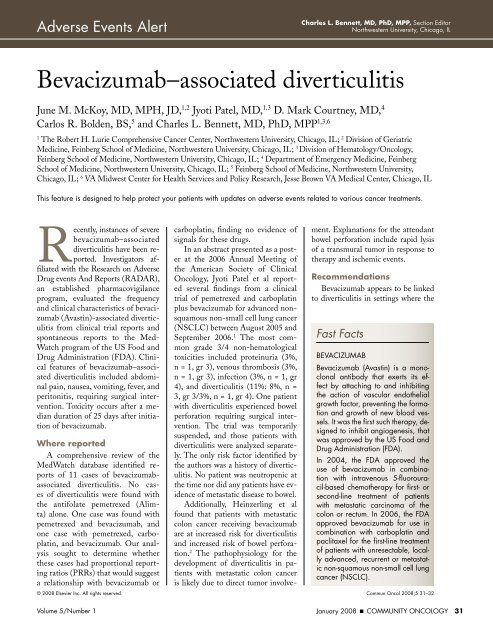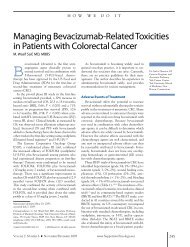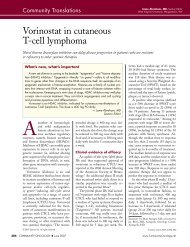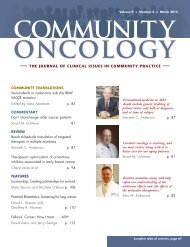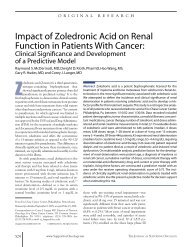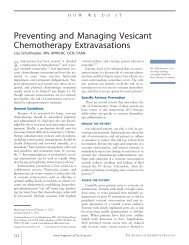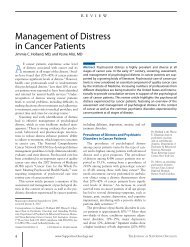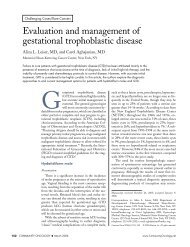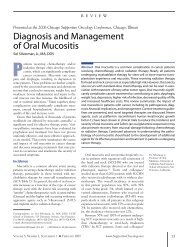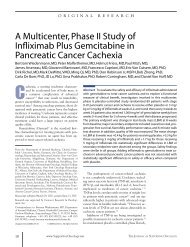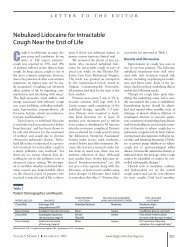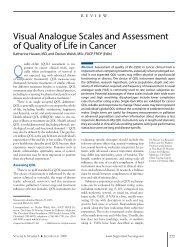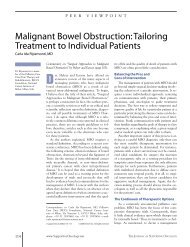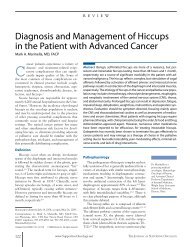Bevacizumab–associated diverticulitis
Bevacizumab–associated diverticulitis
Bevacizumab–associated diverticulitis
You also want an ePaper? Increase the reach of your titles
YUMPU automatically turns print PDFs into web optimized ePapers that Google loves.
Adverse Events Alert<br />
Charles L. Bennett, MD, PhD, MPP, Section Editor<br />
Northwestern University, Chicago, IL<br />
<strong>Bevacizumab–associated</strong> <strong>diverticulitis</strong><br />
June M. McKoy, MD, MPH, JD, 1,2 Jyoti Patel, MD, 1,3 D. Mark Courtney, MD, 4<br />
Carlos R. Bolden, BS, 5 and Charles L. Bennett, MD, PhD, MPP 1,3,6<br />
1<br />
The Robert H. Lurie Comprehensive Cancer Center, Northwestern University, Chicago, IL; 2 Division of Geriatric<br />
Medicine, Feinberg School of Medicine, Northwestern University, Chicago, IL; 3 Division of Hematology/Oncology,<br />
Feinberg School of Medicine, Northwestern University, Chicago, IL; 4 Department of Emergency Medicine, Feinberg<br />
School of Medicine, Northwestern University, Chicago, IL; 5 Feinberg School of Medicine, Northwestern University,<br />
Chicago, IL; 6 VA Midwest Center for Health Services and Policy Research, Jesse Brown VA Medical Center, Chicago, IL<br />
This feature is designed to help protect your patients with updates on adverse events related to various cancer treatments.<br />
R<br />
ecently, instances of severe<br />
bevacizumab–associated<br />
<strong>diverticulitis</strong> have been reported.<br />
Investigators affiliated<br />
with the Research on Adverse<br />
Drug events And Reports (RADAR),<br />
an established pharmacovigilance<br />
program, evaluated the frequency<br />
and clinical characteristics of bevacizumab<br />
(Avastin)-associated <strong>diverticulitis</strong><br />
from clinical trial reports and<br />
spontaneous reports to the Med-<br />
Watch program of the US Food and<br />
Drug Administration (FDA). Clinical<br />
features of bevacizumab–associated<br />
<strong>diverticulitis</strong> included abdominal<br />
pain, nausea, vomiting, fever, and<br />
peritonitis, requiring surgical intervention.<br />
Toxicity occurs after a median<br />
duration of 25 days after initiation<br />
of bevacizumab.<br />
Where reported<br />
A comprehensive review of the<br />
MedWatch database identified reports<br />
of 11 cases of bevacizumabassociated<br />
<strong>diverticulitis</strong>. No cases<br />
of <strong>diverticulitis</strong> were found with<br />
the antifolate pemetrexed (Alimta)<br />
alone. One case was found with<br />
pemetrexed and bevacizumab, and<br />
one case with pemetrexed, carboplatin,<br />
and bevacizumab. Our analysis<br />
sought to determine whether<br />
these cases had proportional reporting<br />
ratios (PRRs) that would suggest<br />
a relationship with bevacizumab or<br />
© 2008 Elsevier Inc. All rights reserved.<br />
carboplatin, finding no evidence of<br />
signals for these drugs.<br />
In an abstract presented as a poster<br />
at the 2006 Annual Meeting of<br />
the American Society of Clinical<br />
Oncology, Jyoti Patel et al reported<br />
several findings from a clinical<br />
trial of pemetrexed and carboplatin<br />
plus bevacizumab for advanced nonsquamous<br />
non-small cell lung cancer<br />
(NSCLC) between August 2005 and<br />
September 2006. 1 The most common<br />
grade 3/4 non-hematological<br />
toxicities included proteinuria (3%,<br />
n = 1, gr 3), venous thrombosis (3%,<br />
n = 1, gr 3), infection (3%, n = 1, gr<br />
4), and <strong>diverticulitis</strong> (11%: 8%, n =<br />
3, gr 3/3%, n = 1, gr 4). One patient<br />
with <strong>diverticulitis</strong> experienced bowel<br />
perforation requiring surgical intervention.<br />
The trial was temporarily<br />
suspended, and those patients with<br />
<strong>diverticulitis</strong> were analyzed separately.<br />
The only risk factor identified by<br />
the authors was a history of <strong>diverticulitis</strong>.<br />
No patient was neutropenic at<br />
the time nor did any patients have evidence<br />
of metastatic disease to bowel.<br />
Additionally, Heinzerling et al<br />
found that patients with metastatic<br />
colon cancer receiving bevacizumab<br />
are at increased risk for <strong>diverticulitis</strong><br />
and increased risk of bowel perforation.<br />
2 The pathophysiology for the<br />
development of <strong>diverticulitis</strong> in patients<br />
with metastatic colon cancer<br />
is likely due to direct tumor involvement.<br />
Explanations for the attendant<br />
bowel perforation include rapid lysis<br />
of a transmural tumor in response to<br />
therapy and ischemic events.<br />
Recommendations<br />
Bevacizumab appears to be linked<br />
to <strong>diverticulitis</strong> in settings where the<br />
Fast Facts<br />
BEVACIZUMAB<br />
Bevacizumab (Avastin) is a monoclonal<br />
antibody that exerts its effect<br />
by attaching to and inhibiting<br />
the action of vascular endothelial<br />
growth factor, preventing the formation<br />
and growth of new blood vessels.<br />
It was the first such therapy, designed<br />
to inhibit angiogenesis, that<br />
was approved by the US Food and<br />
Drug Administration (FDA).<br />
In 2004, the FDA approved the<br />
use of bevacizumab in combination<br />
with intravenous 5-fluorouracil-based<br />
chemotherapy for first- or<br />
second-line treatment of patients<br />
with metastatic carcinoma of the<br />
colon or rectum. In 2006, the FDA<br />
approved bevacizumab for use in<br />
combination with carboplatin and<br />
paclitaxel for the first-line treatment<br />
of patients with unresectable, locally<br />
advanced, recurrent or metastatic<br />
non-squamous non-small cell lung<br />
cancer (NSCLC).<br />
Commun Oncol 2008;5:31–32<br />
Volume 5/Number 1<br />
January 2008 ■ COMMUNITY ONCOLOGY 31
Adverse Events Alert<br />
patient presents with underlying diverticular<br />
disease. Long-term clinical<br />
trials are needed to further evaluate<br />
this signal. In the interim, physicians<br />
should use bevacizumab with caution<br />
in this setting, especially in elderly<br />
patients already at risk for diverticular<br />
disease. We recommend that<br />
physicians maintain a high index of<br />
suspicion for this toxicity and report<br />
the relevant clinical findings to the<br />
FDA’s MedWatch program or to the<br />
RADAR program.<br />
References<br />
1. Patel JD, Hensing TA, Villafor V, Hart<br />
E, Bonomi P. Pemetrexed and carboplatin<br />
plus bevacizumab for advanced non-squamous<br />
non-small cell lung cancer. J Clin Oncol<br />
2007;25(18S)7601.<br />
2. Heinzerling JH, Huerta S. Bowel perforation<br />
from bevacizumab for the treatment of<br />
metastatic colon cancer: incidence, etiology, and<br />
management. Curr Surg 2006;63:334–337.<br />
Dr. Bennett is Associate Director at VA Midwest Center<br />
for Health Services and Policy Research, Chicago,<br />
IL. He is also affiliated with Feinberg School of Medicine,<br />
Robert H. Lurie Comprehensive Cancer Center<br />
of Northwestern University, and VA Midwest Center<br />
for the Management of Complex Chronic Care, Jesse<br />
Brown VA Medical Center; Chicago, IL. He can be<br />
reached at cbenne@northwestern.edu.<br />
32 COMMUNITY ONCOLOGY ■ January 2008 www.CommunityOncology.net


